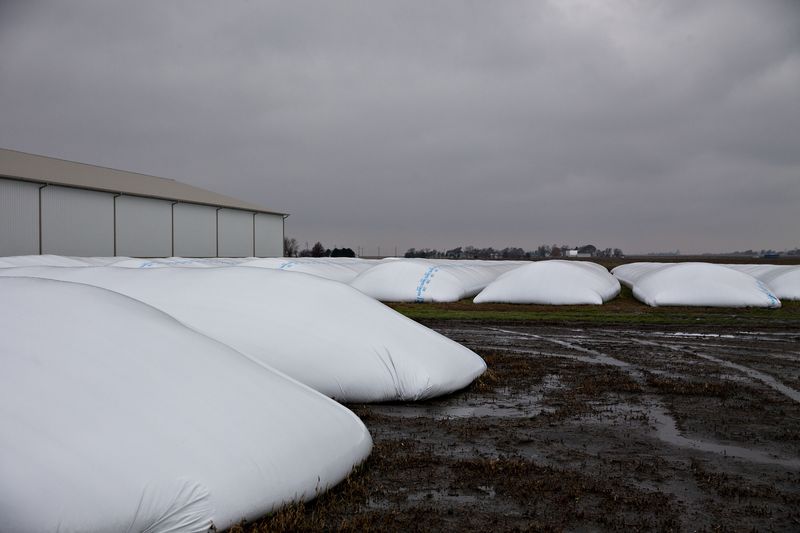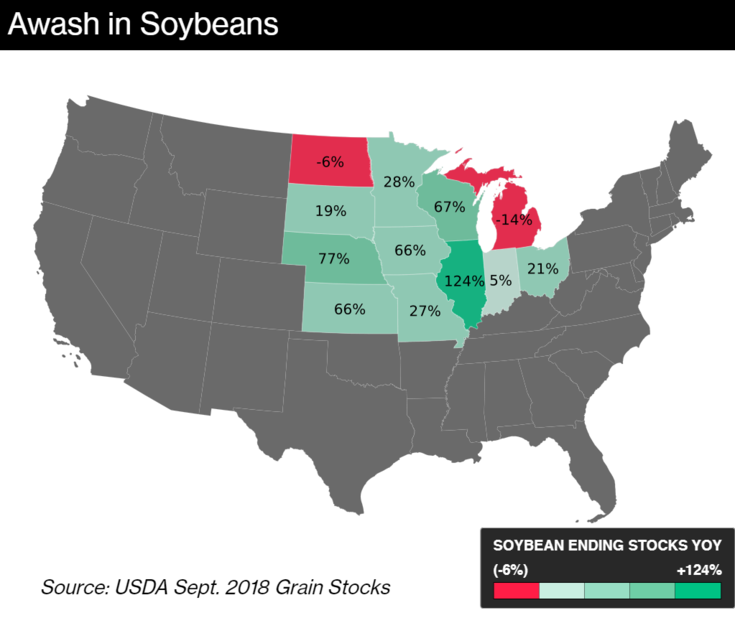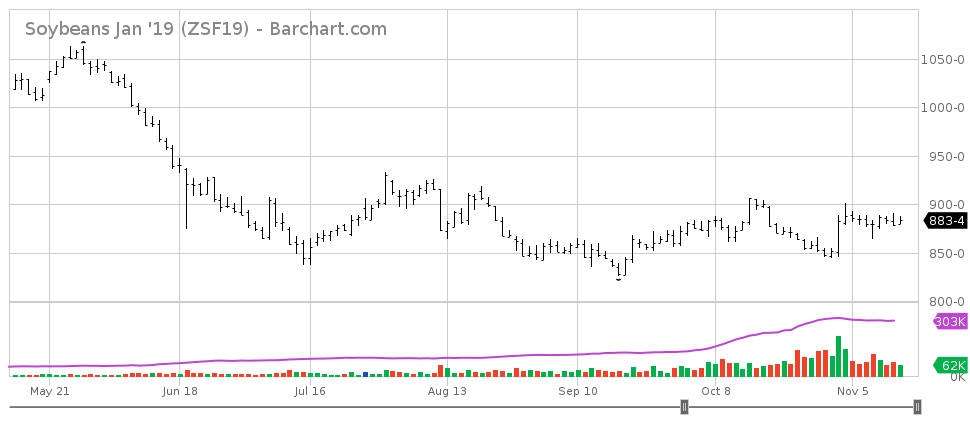For soybeans, among other things.

Source: Bloomberg. Notes: 300-foot plastic bags sit filled with soybeans and corn. Photographer: Daniel Acker/Bloomberg
End-of-September stocks.

Source: Bloomberg.
Note: The end-of-year salvation through higher prices has not materialized yet, at least in futures.

Thanks, Trump!
Continued low prices and massive inventories which means higher inventory costs. And yet CoRev’s model claims this means Iowa farmers are making profits. I’m sure we will read all about this in his American Economic Review paper. But the AER better demand a review of his Excel model!
corev has continued to push the date into the future on when to evaluate whether he was right or wrong. earlier this year, he pushed it to the fall harvest. corev, are you going to move the goalposts again? if so, what is the new future date to evaluate how effective your prediction has been? or are you going to accept today, that you were wrong?
Baffled, wrong about what? I have from the beginning admitted the tariffs would have an effect on lowering prices. My Fall estimates were based upon the the tariffs being shorter lived than the Summer Season. In that I was wrong, and adjusted accordingly.
Pgl unless you would calculate the “break even” price for farmers using business rules and actual real world costs, please stop the ignorant kibitzing.
no corev, you were taking the position that domestic producers need not sell into a low market because they could simply wait for higher prices during the fall harvest, when china would have to come back to the north american suppliers and prices would return to normal. this has not happened. china can hold off on purchases longer than us farmers can store quality product. so the question becomes, how long are we going to continue to provide welfare to the farmers?
It seems economic reality has bit him in the real end so he has started retreating from his initial bizarro positions. But he is still defining break even in terms of price covering accounting costs as if opportunity costs do not exist. I’m wondering if Warren Buffet is seeking out companies that use CoRev’s business practices so he can sell them short!
if you are turning any profit at all, you can run your business by ignoring opportunity costs and still survive. but if you are running at a loss and you are ignoring opportunity costs, you are simply dead in one year. this is the issue to hit farmers in the upcoming year. they may have operated with limited regard to opportunity costs in the past, when they turned a profit and ag business was good. but once in the red, if they still ignore opportunity costs, their last harvest me be soon.
Usual business rules that ignore opportunity costs is what you do. Yes there is “ignorant kibitzing” going on but it is what is coming from your defective Excel models!
Baffled this was my 1st in depth comment on the soybean tariff issue: https://econbrowser.com/archives/2018/06/meanwhile-back-in-iowa#comment-210617
If you read the entire thread you will see I say: “Also, I never said that there was no effect, just not the primary effect you are implying. The article said this: “Soybean futures sank nearly 2%,…” Did you notice the very next paragraph of th article you referenced talked about the weather conditions?” Referring to an earlier comment re: tariffs.
“But the issue was the risks in ag production and acreage planted are more important to prices to the farmer, the basic decision maker, than tariffs.”
https://econbrowser.com/archives/2018/06/meanwhile-back-in-iowa#comment-210626
None of the economic issues discussed matter to a farmer UNTIL HE MAKES A CROP. Making a crop is more susceptible to NATURE than any of their and his buyers’ decisions.
As I’ve said several time now my views are through the eyes of a farmer and only theirs.
As to your assertion: “1) china can hold off on purchases longer than us farmers can store quality product. so the question becomes, 2) how long are we going to continue to provide welfare to the farmers?” Answer- 1) Maybe we have still not reached a point in time to prove your assertion. 2) How long have we had Farm Bills?
BTW, did you realize the “SNAP: was the major component of the Farm Bills? Also consider that the Agriculture committees in Congress are some of the oldest created in 1820-25. so it looks to me we will have Farm Bills indefinitely, or until we no longer need welfare/food stamps for so many US citizens.
Pgl take to heart Baffled’s comment: “if you are turning any profit at all, you can run your business by ignoring opportunity costs and still survive.” NO ONE has argued that opportunity costs can and should be considered in making management decisions in adding efficiencies to the operations and bottom line.
“NO ONE has argued that opportunity costs can and should be considered in making management decisions in adding efficiencies to the operations and bottom line.”
We have a new candidate for the dumbest comment ever. There are entire texts in business school that note the role of opportunity costs. Of course you have never read any of them as you are too busy babbling nonsense.
Pgl, that should have read: “NO ONE has argued that opportunity costs can and should not be considered in making management decisions in adding efficiencies to the operations and bottom line.” Indeed for farmers annually they must consider what, how much and where they should plant their crops and TO PLANT ANYTHING OR NOT .
I’m confused. If farmers don’t plant ANYTHING, how do they make ANY money? If they don’t make ANY money, how do they continue in business as farmers?
Noneco, primarily they lease out their land to others.
“Noneco, primarily they lease out their land to others.”
“others” would be farmers as well, so an economic decision still needs to be made about the crops. this answer does not resolve the problem corev. unless we have people leasing farmland who let it sit fallow because they don’t know how to farm????
Baffled, did you have a point? ” so an economic decision still needs to be made about the crops.” That is done each and every year and several times during the growing/harvest seasons.
And, ” this answer does not resolve the problem corev.” What problem were we resolving?
Well, baffling, maybe they lease land to a company that wants to build an amusement park (or a baseball field). We all know: if you build it, they will come (especially since you can’t make money growing anything).
“Baffled, did you have a point?”
yes corev. your response “primarily they lease out their land to others.” to the question posed “If farmers don’t plant ANYTHING, how do they make ANY money? If they don’t make ANY money, how do they continue in business as farmers?” was circular. somebody has to plant something. a farmer will not lease land so that they can simply leave it empty, unless you subscribe to the theory that in farming there will always be a sucker?
“What problem were we resolving?”. we are solving the problem of how a farmer makes money if he does not plant anything. your solution requires finding a bigger fool. why do you think so lowly of the farmer corev?
as i have told you before corev, the problem with discussing things with you is you become circular in your arguments, eventually contradicting yourself without realizing it. it makes pointing out your mistakes difficult, because we get flaws coming in from all angles.
@Menzie
When you said “Large white bag” I just assumed you were talking about Trump. Oh sh*t!!!!—-that’s right, Trump is a “Large orange bag”. What was I thinking!?!?!?!?!?!
I wonder how wealthy CoRev is on his soybean futures contracts now?? Only George Soros could dream to have CoRev’s deep vision to foresee what lies ahead. CoRev even has members of the Great Cabal Conspiracy jealous of him now. Rumor has been heavy the last 6 months that unofficial backdoor channels are reaching out to see if CoRev will accept the job of being Trump’s new Secretary Of Agriculture. But I have to think with his new windfall of YUUUUUUUGE profits CoRev is going to turn this position down.
https://www.youtube.com/watch?v=Q3gFmielRS8
Well, You can’t win them all you know. The great inheritor trump didn’t raise crop values on soybeans, corn, wheat. Trump didn’t raise the values that farmers sell their pork. But trump has been OUTSTANDING at raising prescription drug prices. That’s what “PeakIgnorance’s” Grandma told me this morning when I was walking by the prune juice at the grocer’s. GrandmaPeak said Trump is “doing awesome” on prescription drugs. She has plenty of money now. GrandmaPeak says now she can buy the premium dog food in the supermarket after that rough patch she had paying in full her grandson’s loan to attend Corinthian Colleges.
https://www.wsj.com/articles/pfizer-raises-prices-for-dozens-of-drugs-1530560714
https://www.wsj.com/articles/cvs-gets-a-boost-from-more-prescription-sales-1533730060
https://www.wsj.com/articles/high-priced-drugs-raise-costs-for-seniors-in-medicare-part-d-1496055603
https://www.wsj.com/articles/cancer-drug-price-rises-1400-with-no-generic-to-challenge-it-1514203201
Thank TBN Superficial Jesus for Trump’s “private sector solutions” to outrageously high prescription drug prices. I heard Mike Pence, Mitt Romney, Mike Huckabee, James Lankford, and Sarah Piggy Sanders made a special prayer to TBN Superficial Jesus to initiate the “private sector solutions” for high prescription drug prices. Piggy…..I mean Sarah, was overheard at the White House “Dear TBN Superficial Jesus!!!! Dear dear TBN Superficial Jesus!!!! Help Pfizer to help old women relieve their burdens of a healthy savings account. And also, dear Superficial TBN Jesus, can you tell the hispanic underling at Carl’s Jr drive-thru I visit every morning to listen to me when I told her I want a triple serving of gravy on my Carl’s Jr biscuits and gravy?? I mean, please TBN Superficial Lord, can’t you help the sub-humans to understand the words “triple serving of gravy” when I order my biscuits and gravy!?!?!?!?! I mean, come on!!!! Come on TBN Superficial jesus!!! Throw me some extra gravy here!!!”
Sanders wore a special pink dress for the prayer meeting: https://goo.gl/images/GZCjJA
The trouble with Hogwarts…..
https://www.wired.com/story/voldemorting-ultimate-seo-diss-resident-linguist/
Tea Party through the Looking Glass. Middle school
While the national news carries ‘uncritical coverage’ of expert “defense” fear mongering paid by congress, the crew who says: “they will burn the White House again if the US don’t spend 7% GDP in the pentagon trough”!
Pgl, I also wonder if you remember how many times in previous soybean articles you denied, denigrated, and or minimized storage as a major decision factor for farmers? Did you note the subject of this article?
Admittedly, this year is dominated by the tariff impacts, but it is seldom mentioned this is a near or actual bumper soybean crop year and storage would have been an issue regardless.
CoRev I’m not sure what your point is. No one ever said farmers could not store beans and corn if they were willing to pay the storage costs. The point is that increasing storage capacity costs money. And the more corn and beans you have to store, the more it costs. I trust this is pretty obvious. At the margin some farmers will have to exit the market who otherwise would not have gone out of business were it not for China’s reaction to Trump’s tariffs. The relevant cost is not the average cost that you keep talking about, it’s the marginal cost of the marginal producer. Thanks to Trump’s tariff wars farmers will get a lower price for their beans and that lower price will have to cover higher costs. I only hope that the farmer who loses his land and livelihood is one of those farmers who also voted for Trump.
And if you’re a grain farmer, what’s your planting strategy for next year? Plant corn and risk the chance that everyone else plants corn as well? Or plant soybeans and hope the tariff wars are resolved by next summer? It’s already mid-November, so you better make up your mind quickly about next year’s crop. What price should you target when making planting decisions? Meanwhile, the banker wants to be paid for this year’s loan and he won’t take a bag of soybeans as payment.
2slugs, your grasp of the obvious adds no value except for those outside farming country. You just described their typical annual decision and working cycle while thinking this year is unique. This year is exacerbated by the tariffs, but the recent experience of soybean farmers with huge buys from Chinese buyers is the more outside the norm.
This hatred however, ” I only hope that the farmer who loses his land and livelihood is one of those farmers who also voted for Trump.” is the point, as an example of the putrid liberal mind as demonstrated by the many, many pgl comments.
CoRev Given that Trump’s policies will result in some farmers going bankrupt that otherwise would not have gone bankrupt, I would prefer that it be those who voted for Trump that pay the cost. Or would you prefer that those who didn’t vote for Trump pay the costs of Trump’s policies??? You might regard that as the product of a “putrid liberal mind”, but it strikes me as a simple case of justice.
As to farmers facing uncertainty, I think this year the problem is more acute than normal. Normally farmers worry about variability due to weather and ordinary market turbulence. Those are quantifiable risks. But trade wars reflect policy uncertainty, which is very different from variability. If you don’t understand why, the try googling “Knightian Uncertainty.” It’s a pretty fundamental distinction in economics and operations research.
2slugs, I think you meant to use some other term than quantifiable: “… due to weather and ordinary market turbulence. Those are quantifiable risks…”. I would have used something like normally, or regularly anticipated risks. How do you quantify weather risk which can range from 0 to 100+% DIRECT loss risk of not only a crop, but of the farm and even the family? Trade policy MAY for a short period affect pricing and sales of certain crops. They deal with this type of risk uncertainty annually. I’ve tried to show you that policy uncertainty does not necessarily equate to monetory or at least serious monetary loss. Prices are lower than in recent years, but farmers are also offered a Govt differential to make us for some of that price differential.
I see you have doubled down with the angry, hating liberal meme, and think nothing about it.
CoRev No, I meant “quantifiable.” This is an econ blog. Please make an effort to understand basic terms and concepts.
As to the government offering a “Govt differential” I think you meant to say “Govt handout.”
2 slugs, then quantify the risks. I quantified weather risks in %s to the farmer, so quantify your: “Normally farmers worry about variability due to weather and ordinary market turbulence. ” You can even use my weather percentages.
Aren’t those Govt SUBSIDY payments based upon differentials in value received by the FARMER from a crop?
“Under the USDA formula, soybean farmers would be paid $1.65 per bushel at 50 percent of anticipated production levels. ”
https://www.thegazette.com/subject/news/government/donald-trump-tariffs-iowa-soybean-farmers-federal-aid-20180827
and as I have already explained there is a 2018 farmer safety net supporting soybean farmers:
“…Around 50 percent of the soybean crop has been forward-contracted. That means many producers secured high prices for their crop last spring, which will help them weather the brunt of the trade war this year. John Heisdorffer, president of the American Soybean Association, suggests that the government subsidies will particularly benefit growers who did not forward-contract and could use the money to support financing next year’s crop.
Other government support programs, including Agriculture Risk Coverage (ARC) and Price Loss Coverage (PLC), are intended to protect farmers from falling commodity prices. However, crop-insurance payments are adjusted to reflect average market prices, and if prices continue to slide, farmer revenue will decrease as well….”
and
“…At the moment, the majority of farmers are expected to break even or experience a loss. According to the USDA’s Economic Research Service, net cash farm income (NCFI) across the soybean farm sector is expected to decline by 8.8 percent this year, the fourth consecutive yearly decline. …”
Farming is a tough business. Even in bumper crop years farmer can be losers because the bumper crop can disqualify them from insurance supported price declines.
” And, given this year’s expected bumper crop, high yields may disqualify many farmers from receiving crop-insurance payments.”
https://gro-intelligence.com/insights/what-new-us-subsidies-mean-for-soybean-farmers
We agree that 2019 planting planning will be more complex than past years, but disagree on how badly farmers will be hurt in 2018.
corev, at least be honest and admit it is a government handout by trump to buy votes. let’s call a spade a spade. unless you want to be dishonest-which i anticipate you will.
corev is in the process of rewriting his arguments, now that he looks back and sees how silly they were.
and regarding your off topic rants about snap and ag committees, let me remind you the current issue is the farmer welfare trump has created due to the tariffs and their negative impact on us soy producers. i want to know how long you will continue to support this welfare for the farmers, which is a direct result of trump policymaking. or let me rephrase this, corev, why do you continue to support trump buying votes to support his failing policies?